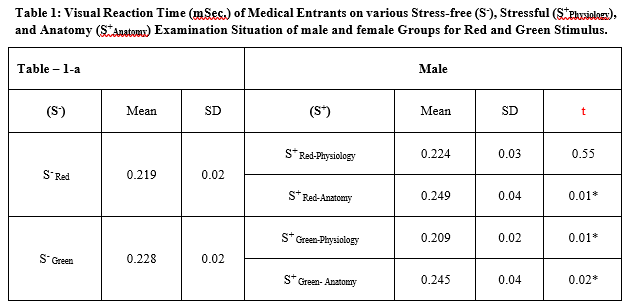Impact of examination stress on response time in first-year medical students
Abstract
Background: Stress has been seen to deteriorate normal physiological functions as well as the psychological functions of the brain. Medical students face a range of enduring normative stressors in the form of academic demands. This brings upon an amount of stress on the students which is related to the examinations and concerns with achieving high grades consequently referred to as academic-related stress. Thus, it becomes crucial to set upon a tool for measuring this stress in order to present methods for overcoming it. In the present study, one such method is evaluated by assessing the reaction time of first-year medical entrants.
Material and Methods: The effect of stress on response time in 50 normal healthy medical students of Sawai Man Singh Medical College, Jaipur in the age group of 18 to 21 years was explored in the study. Visual Reaction Time was recorded through the computer program.
Results: There was an increase in visual reaction time for the red color in both the sexes during stressful situations as compared to stress-free situations. While a decrease in Visual Reaction Time was seen for green color. A decreased auditory reaction time for both sexes was seen in stressful situations.
Conclusion: The results revealed that stress within a limit facilitates positive feedback to Central Nervous System information processing consequently decreasing the reaction time.
Downloads
References
Pollock K. On the nature of social stress: Production of a modern mythology. Soc Sci Med.1988;26(3):381-392. doi: 10.1016/0277-9536(88)90404-2.
Akgun S, Ciarrochi J, Learned Resourcefulness Moderates the Relationship Between Academic Stress and Academic Performance. Educ Psychol. 2003;23(3):287-294. doi: 10.1080/0144341032000060129.
Struthers CW, Perry RP, Menec VH. An examination of the relationship among academic stress, coping, motivation, and performance in college. Res High Educ. 2000;41(5):581–592. doi: 10.1023/A:1007094931292.
Stowell JR. Use and Abuse of Academic Examinations in Stress Research. Psychosom Med. 2003;65(6):1055-1057. doi: 10.1097/01.PSY.0000097349.84109.1F.
Kiecolt-Glaser JK, Garner W, Speicher C, Penn GM, Holliday J, Glaser R. Psychosocial modifiers of immunocompetence in medical students. Psychosom Med. 1984;46(1):7-14. doi: 10.1097/00006842-198401000-00003.
Lofthus GK, Sensorimotor Performance and Limb Preference. Percept Mot Skills. 1981;52(3):683-693. doi: 10.2466/pms.1981.52.3.683.
Shavanani AB, Udupa KA. Acute effect of Mukh bhastrika (a yogic bellows type breathing) on reaction time. Indian J Physiol Pharmacol. 2003;47:297-300.
Malathi A, Parulkar VG. Evaluation of anxiety status in medical students prior to examination stress., Indian J Physiol Pharmacol. 1992;36:121-122.
Malathi A, Parulkar VG. Effect of yogasanas on the visual and auditory reaction time. Indian J Physiol Pharmacol. 1989;33(12):110-112.
Zajdel R, Nowak D. Simple and complex reaction time measurement: a preliminary evaluation of new approach and diagnostic tool. Comput Biol Med. 2007;37(12):1724-1730. doi: 10.1016/j.compbiomed.2007.04.008.
Venkatesh D, Ramachandra DL, Baboo NS, Rajan BK, Impact of psychological stress, gender and colour on visual response latency. Indian J Physiol Pharmacol. 2002;46(3):333-337.
Elliot AJ, Niesta D. Romantic red: Red enhances men's attraction to women. J Personal Social Psychol. 2008;95(5):1150.
Hatta T, Yoshida H, Kawakami A, Okamoto M. Color of Computer Display Frame in Work Performance, Mood, and Physiological Response. Percept Mot Skills. 2002;94(1):39-46. doi: 10.2466/pms.2002.94.1.39.
Garrett HE, The two-factor theory and its criticism, Psychol. Rev. 1935;42:293–301. doi: 10.1037/h0055118.
Melton AW, The methodology of experimental studies of human learning and retention I; The functions of a methodology and the available criteria for evaluating different experimental methods. Psychol Bull. 1936;33(5):305-394. doi: 10.1037/h0055784.
Kar M. Evaluation of Examination Stress and Its Effect on Cognitive Function among First Year Medical Students. J Clin Diagnostic Res. 2014;8(8):BC05. doi: 10.7860/JCDR/2014/9014.4680.
Muley DA, Wadikar SS, Muley DP. Effect of exam Stress on reaction time in medical students. Indian J Basic Appl Med Res. 2016;5(4):733-739.
Yaribeygi H, Panahi Y, Sahraei H, Johnston TP, Sahebkar A. The impact of stress on body function: A review, EXCLI J. 2017;16:1057-1072. doi: 10.17179/excli2017-480.
Becker L, Rohleder N. Time course of the physiological stress response to an acute stressor and its associations with the primacy and recency effect of the serial position curve. PLoS One. 2019;14(5):e0213883. doi: 10.1371/journal.pone.0213883.

Copyright (c) 2020 Author (s). Published by Siddharth Health Research and Social Welfare Society

This work is licensed under a Creative Commons Attribution 4.0 International License.


 OAI - Open Archives Initiative
OAI - Open Archives Initiative


